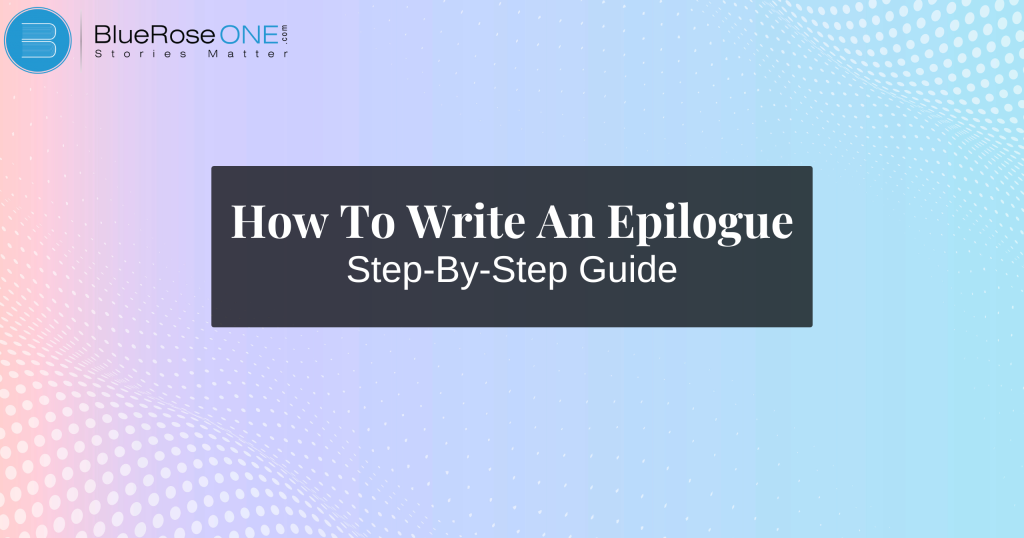
How To Write An Epilogue: Step-By-Step Guide
An epilogue may be like the ribbon on a beautifully wrapped present, giving your story the finishing touch it needs to stay with readers long after they’ve finished the book. Are you ready to dive in? Here’s everything you should know! What is an Epilogue? An epilogue may be like the ribbon on a beautifully wrapped present, giving your story the finishing touch it needs to stay with readers long after they’ve finished the book. Are you ready to dive in? Here’s everything you should know! Purpose of an Epilogue The epilogue ties up loose ends, provides resolution, or reveals the consequences of the story’s actions. It’s a chance to give your readers a good send-off. You may aslo read: The 7 Best Fantasy Book Series of All Time Why Include an Epilogue in Your Story? Wrapping Up Loose Ends An epilogue allows you to tie up any lingering questions or unresolved plotlines, giving readers a sense of closure. Addressing minor details or secondary character outcomes improves the overall narrative and satisfies the audience’s curiosity. This is especially useful in stories with complex arcs or fatal character faults, since it allows the writer to consider the repercussions of such defects and create a satisfying final resolution. Providing Closure to Readers An epilogue contributes to closure by tying up loose ends and answering questions that remain after the main story concludes. It provides readers with a glimpse into what happens to the characters or the planet after the climactic fight, offering a sense of closure. Stories with terrible ends due to a fatal fault can be softened with an epilogue that depicts growth, atonement, or hope. This allows readers to feel satisfied and emotionally settled. Offering a Glimpse into the Future An epilogue can provide readers with a satisfying conclusion by revealing your characters‘ future. It enables you to demonstrate how the events of the story have affected their lives, providing closure and a sense of growth. For stories in which a character’s fatal fault is crucial, the epilogue can show whether they have conquered their weakness or are still dealing with the consequences, providing depth and meaning to the narrative’s denouement. You may also like: 12 Character Archetypes Every Author Should Learn About Key Elements of a Well-Written Epilogue Continuity with the Main Story A well-written epilogue connects the main plot by addressing unanswered questions and closing up loose ends. It should feel like a logical continuation of the story, strengthening themes, character arcs, or the core conflict. The epilogue assures reader satisfaction by remaining consistent with the tone and events of the main storyline, while also providing a glimpse into the characters’ future or the long-term impact of their choices, thus increasing the story’s emotional resonance. Relevant Themes or Messages A well-written epilogue brings the story’s themes and messages together, giving readers a sense of closure. It examines the protagonist‘s fatal fault, demonstrating how their journey has influenced their progress or demise. The epilogue underscores the meaning of the novel by addressing important themes like love, sacrifice, and redemption. This connection enables readers to comprehend the broader ramifications of the character’s decisions and the overall narrative, leaving a lasting impression that extends beyond the conclusion. Emotional Resonance A well-written epilogue should leave an emotional impression on readers by tying up loose ends and reflecting on the story’s main themes. Emotional resonance helps the reader understand the characters development and the implications of their fatal defects. Whether it’s a melancholy farewell or a moment of triumph, the epilogue should elicit emotions that last long after the story has ended, offering a sense of closure and highlighting the moral or lesson of the story. You may also read: What is a Narrative Arc? Understanding the Backbone of Great Stories When Should You Write an Epilogue? Suitable Genres for Epilogues Epilogues are effective in genres like romance, fantasy, mystery, and science fiction. In romance, they provide a glimpse into the characters’ life after the story has concluded, providing closure. Epilogues are commonly used in fantasy and science fiction to foreshadow future adventures or explain the events’ long-term impact. In a mystery, an epilogue can reveal hidden details or answer unsolved problems. Epilogues are beneficial to these genres because they give depth and resolution to the story. When an Epilogue Might Not Be Necessary An epilogue may not be required when the story’s finale is already complete and leaves no unanswered questions. An epilogue may be unnecessary if the narrative arc has been entirely ended and the character’s journey or transformation feels complete. For example, in stories when the protagonist’s fatal defect is fully explored and conquered, including an epilogue may distract from the impact of the ending. Instead, leaving the audience to dwell on the resolve without further criticism can have a greater impact. Step-by-Step Guide to Writing an Epilogue Step 1: Understand Your Story’s Needs Before you write your epilogue, think about what your story really needs. Does the character’s journey feel complete, or is there more to discover? An epilogue should address outstanding issues, bring closure, or give a glimpse into the future. Make sure it fits the tone of the story and is consistent with the topic, especially when dealing with a deadly fault. The epilogue should describe how the character changed or failed to change as a result of their fatal fault. Step 2: Decide on the Timeframe When writing an epilogue, one critical step is determining the time frame. The epilogue can take place right after the main story or years later. Consider how much time has elapsed since the events of the story and how this affects your characters. If your characters have grown or evolved, depicting their progress can give depth to your story. Choose a timeframe that fits your story’s themes and provides closure for your audience. Step 3: Outline Key Points When writing an epilogue, outline the main topics you wish to cover. Begin by recapping the events of the story and demonstrating how…

Fatal Flaw: Definition, Types, Examples and More
What is a Fatal Flaw? A fatal defect, sometimes known as a “tragic flaw,” is a character feature that leads to the demise of a protagonist or major player in a story. Unlike minor defects, fatal flaws are firmly ingrained in the character’s nature and are essential to the plot. You may also read: 10 Proven Stratgies for Crafting the Perfect Book Title How It Differs from Other Character Flaws Not every defect is fatal. While a character may have eccentricities or poor habits, a fatal fault has a direct impact on the story’s outcome, which is generally tragic. Why Fatal Flaws Are Important in Storytelling Fatal faults heighten tension and keep readers engaged. They make characters more complex and relatable, demonstrating that even heroes are imperfect. You may also like: Top 10 Classic Literature Books Everyone Should Read At Least Once Types of Fatal Flaws in Literature Hubris Hubris is extreme pride or arrogance that causes a character to disregard moral precepts, cultural norms, or even the gods. In literature, it is a common fatal defect that leads to the demise of many protagonists, such as King Oedipus in Oedipus Rex. Hubris blinds characters to their own limitations, resulting in rash decisions or overconfidence. This defect frequently acts as a cautionary tale, emphasizing the value of humility and self-awareness. Classic Examples of Hubris: Think of King Oedipus, whose pride blinds him to the truth. Why Hubris Makes Characters Relatable: Everyone has moments of overconfidence, making these characters both frustrating and familiar. Greed Greed is a typical fatal defect in literature, in which a character’s insatiable desire for wealth, power, or success leads to their demise. This defect frequently renders people insensitive to ethical limits, relationships, and long-term implications. Classic examples include Shakespeare’s Macbeth, in which the protagonist’s desire for power leads to murder, and Dickens’ A Christmas Carol, in which Scrooge’s greed isolates him from love and generosity. Greed serves as a warning sign, emphasizing the devastating power of unbridled ambition. Stories Where Greed Led to Downfall: Characters like Jay Gatsby illustrate how greed for love or wealth can lead to ruin. Lessons Drawn from Greedy Characters: They remind readers of the dangers of prioritizing material gains over moral values. You may also like: Top 10 Tony Robbins Books That Inspire Success and Change Obsession In literature, obsession is a potent fatal defect in which a character becomes overly fixated on a person, concept, or purpose. This extreme concentration frequently causes people to lose sight of reality, which results in bad choices and disastrous consequences. For instance, Captain Ahab disregards the safety of his crew and his own health in Moby-Dick due to his compulsive hunt for the white whale. The fatal fault of obsession draws attention to how unbridled passions can overwhelm a person and finally bring them to ruin. Famous Obsessive Characters in Fiction: Captain Ahab from Moby-Dick is a perfect example. The Balance Between Ambition and Destruction: Obsession shows how a character’s greatest strength can also be their undoing. You may also read: Query Letter vs Cover Letter: What’s the Difference? You may also read: 150+ Positive Words That Start with O to Brighten Your Vocabulary How to Write a Character with a Fatal Flaw Identifying the Flaw Aligning the Flaw with the Story’s Theme: The flaw should resonate with the central message of your story. Balancing the Flaw with the Character’s Strengths: Characters are more engaging when their flaw contrasts with their heroic traits. Developing the Flaw Showing the Flaw in Action: Use pivotal scenes to demonstrate the flaw’s impact. Using Dialogue and Actions to Reveal the Flaw: Subtle hints in interactions can make the flaw feel natural. The Downfall and Redemption Arc Structuring the Character’s Arc: A well-planned arc takes the character from success to downfall (and sometimes redemption). When Redemption Works and When It Doesn’t: Redemption should feel earned, not forced. You may also like: Too Good To Be True a Book By Prajakata Koli You may also read: Adjectives that starts with e | Words Popular in America When to Use a Fatal Flaw in Your Story Early in the Plot to Set Conflict: The story’s main conflict is established and readers are given insight into the character’s problems when a fatal flaw is introduced early in the tale. This defect has the power to influence the character’s path, impose difficult choices, and cause instant challenges. The fatal flaw propels the story along and draws readers in by laying the groundwork for either growth or downfall. For instance, a hero’s conceit could result in a mission failure, raising the stakes for atonement or more serious conflict. Midway to Deepen Tension: By revealing the fatal defect halfway through your story, you can dramatically increase the emotional stakes and suspense. The protagonist is often now resolutely working toward their objective. However, its fatal flaw’s discovery or impact can impede progress, provide unforeseen difficulties, or strain relationships. By introducing layers of conflict and uncertainty, this timing keeps readers interested. A gripping conclusion is set up by the protagonist’s fight to overcome or give in to their defect. Climax for Maximum Impact:By increasing the stakes and emotional intensity, a character’s fatal fault can be included into the finale to maximize impact. The protagonist’s choices should be directly impacted by the fault, resulting in a crucial moment of success or failure. For instance, a hero may make a crucial misstep because of their conceit, only to recognize it in the conclusion. This strategy gives the character arc more depth and guarantees that the viewer will feel that the conclusion was well-earned. You may also like: Dynamic Characters: Definition, Examples and Tips to Write Them Famous Examples of Fatal Flaws in Literature and Film Oedipus Rex by Sophocles: Hubris blinds Oedipus to the truth. Macbeth by William Shakespeare: Ambition drives Macbeth to madness and murder. The Great Gatsby by F. Scott Fitzgerald: Gatsby’s obsession leads to his tragic demise. Harry Potter Series by J.K. Rowling: Overconfidence sometimes clouds Harry’s judgment. You may also read: Aravind…
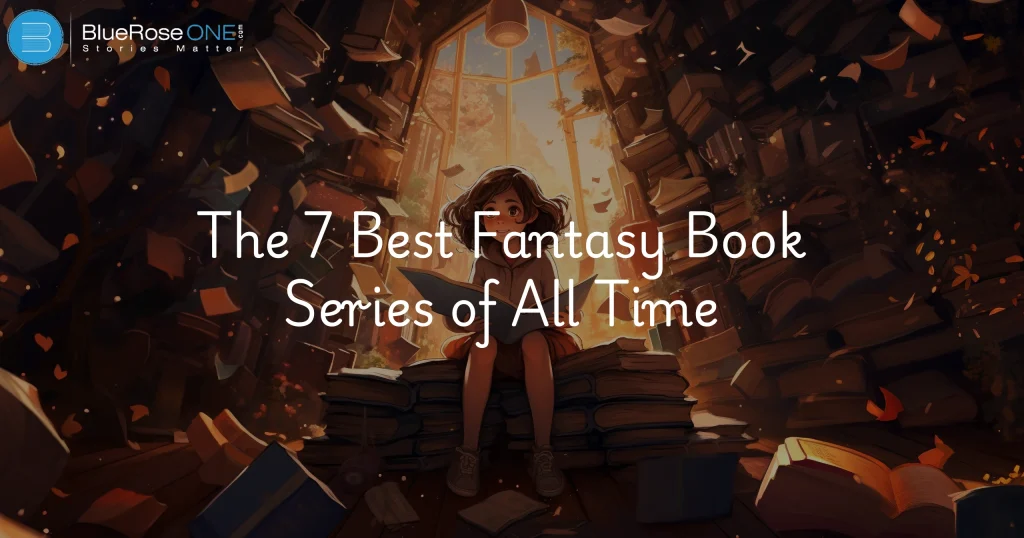
The 7 Best Fantasy Book Series of All Time
Fantasy literature has a unique ability to take readers to completely new worlds full with magic, adventure, and intriguing characters. But what makes a fantasy series genuinely memorable? It combines great storytelling, inventive world-building, and the capacity to elicit wonder. Here are seven of the best fantasy novel series that have captivated millions of readers. 1. The Lord of the Rings by J.R.R. Tolkien The Lord of the Rings is arguably the most important fantasy trilogy of all time, introducing readers to Middle-earth, a beautifully built realm with its own languages, civilizations, and histories. The tale of Frodo Baggins and his perilous journey to destroy the One Ring established the benchmark for epic fantasy. You may also like: Ten Strategies to Handle Negative Reviews | BlueRoseOne 2. A Song of Ice and Fire by George R.R. Martin A Song of Ice and Fire by George R.R. Martin is one of the most popular fantasy book series of all time. Set in the fictional continents of Westeros and Essos, it follows multiple characters, families, and political plots as they fight for control of the Iron Throne. Known for its complex characters, intricate world-building, and shocking twists, the series explores themes of power, loyalty, and betrayal. With books like A Game of Thrones, it has inspired a major TV series and gained a massive global following. You may also like: Aravind Adiga Books of All Time | BlueRoseOne 3. The Harry Potter Series by J.K. Rowling J.K. Rowling’s Harry Potter series is one of the best-selling fantasy books of all time. It tells the narrative of Harry, a teenage wizard who discovers his magical lineage and faces terrible forces at Hogwarts School of Witchcraft and Wizardry. With themes of friendship, bravery, and love, the series appeals to readers of all ages. Its vivid universe, complicated people, and magical creatures have made it a popular and long-lasting component of fantasy fiction. You may also read: 10 Best Magical Books That Combine Christmas and Fantasy You may also like: Top 10 Arundhati Roy Books You Must Read in 2025 4. The Wheel of Time by Robert Jordan (and Brandon Sanderson) “The Wheel of Time” by Robert Jordan (and Brandon Sanderson) is a renowned fantasy series spanning fourteen volumes. It recounts the quest of Rand al’Thor, a young man who is destined to defeat the Dark One and save the planet. The series is known for its elaborate world-building, diverse characters, and complicated political intrigue, which combine magic, prophecy, and adventure. Following Jordan’s death, Brandon Sanderson finished the last novels, preserving the series’ epic scale and fan appeal, establishing it as one of the best fantasy series of all time. You may also read: List of Top 10 Famous Ravinder Singh Books of All Time 5. The Stormlight Archive by Brandon Sanderson Brandon Sanderson’s The Stormlight Archive is a modern epic fantasy series renowned for its intricate world-building, complex characters, and captivating plots. Set in the storm-ravaged world of Roshar, it follows a cast of heroes, including warriors, scholars, and monarchs, as they deal with personal problems and broader threats to their society. With its distinct magic systems and emotional depth, the series, which began with The Way of Kings, has enthralled readers and is frequently cited as a standout in fantasy fiction. You may also like: Too Good To Be True a Book By Prajakata Koli You may also read: Mistborn Series in Order: Start to Finish 6. His Dark Materials by Philip Pullman Philip Pullman’s His Dark Materials trilogy is a beloved fantasy series that combines adventure, science, and philosophy. The plot revolves around Lyra Belacqua and Will Parry, two children who travel through parallel worlds replete with witches, armored polar bears, and daemons—animal embodiments of human souls. The trilogy delves on topics of free will, knowledge, and the power of love. His Dark Materials, with its complex world-building and thought-provoking plot, captivates readers of all ages and is a must-read in fantasy literature. You may also like: Foreword vs. Preface: Know the Difference You may also like: 100+ Adjectives That Start with C (With Definitions & Examples) 7. The Chronicles of Narnia by C.S. Lewis The Chronicles of Narnia by C.S. Lewis is a classic fantasy series that has captured readers’ hearts for generations. The seven books take readers to the magical world of Narnia, where talking animals, brave children, and epic battles between good and evil unfold. Themes of friendship, courage, and redemption are woven into the stories, making them both entertaining and meaningful. With its imaginative storytelling and timeless appeal, this series is a must-read for fantasy lovers of all ages. You may also read: A Complete List of Anuja Chauhan Books Key Elements That Make a Fantasy Series Great A great fantasy series has a few key elements that draw readers in. First, it needs a well-built world with rich details, unique cultures, and magical systems that feel believable. Memorable characters with depth and personal growth keep readers emotionally invested. An engaging plot with unexpected twists adds excitement, while themes of friendship, bravery, or love make the story relatable. Finally, a touch of mystery or wonder keeps readers eager to explore the next book in the series. You may also read: First Person Point of Viewe: An Essential Guide You may also like: Where the Red Fern Grows: Book Summary & Themes Conclusion Fantasy series provide a magical escape and the opportunity to dream. Whether you’re new to the genre or a longtime fan, these seven series are a great place to start. Dive in and let the adventure begin!
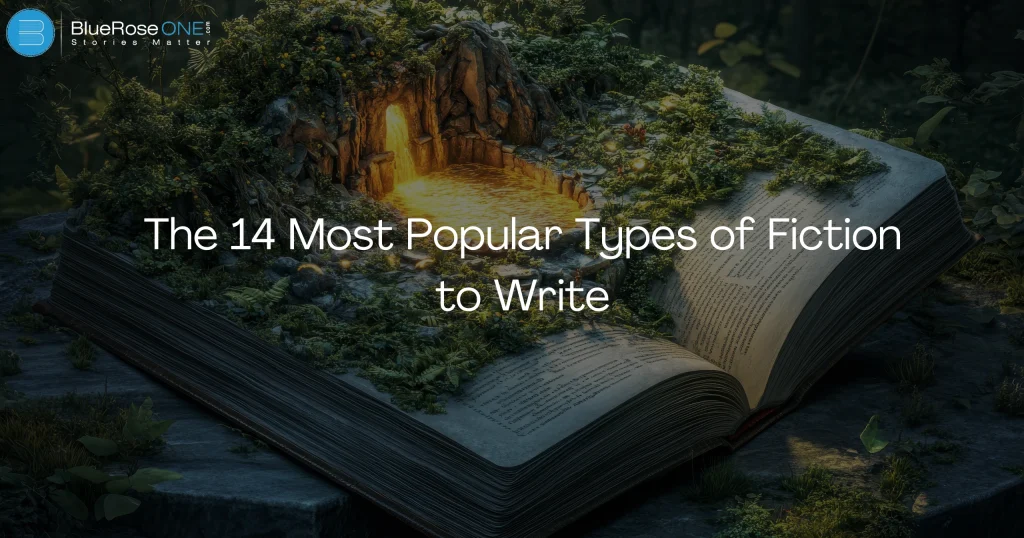
The 14 Most Popular Types of Fiction to Write
What is Fiction? Fiction is a type of storytelling in which the tale is based on the imagination rather than real-life experiences. From epic stories of heroism to passionate romantic sagas, fiction allows writers to create worlds and characters that readers connect with. Why Choose Fiction Writing? Fiction provides endless creative options. It allows writers to explore universal issues, elicit emotions, and connect with their audiences on a personal level. Plus, who doesn’t enjoy the challenge of building a universe from scratch? Let’s explore the 14 most popular types of fiction- Literary Fiction Literary fiction explores difficult subjects, character development, and the human condition. Unlike genre literature, it emphasizes style and depth above plot-driven storytelling, frequently diving into philosophical or emotional themes. Literary fiction typically challenges readers with thought-provoking themes and complex storytelling. Famous examples include Harper Lee’s To Kill a Mockingbird and F. Scott Fitzgerald’s The Great Gatsby. This kind of literature is great for writers looking to create important, timeless works. Examples of Literary Fiction Books like The Great Gatsby by F. Scott Fitzgerald and To Kill a Mockingbird by Harper Lee are classic examples of literary fiction. You may also like: Literary Elements: A Complete List of Powerful Literary Devices Historical Fiction Historical fiction is a genre that combines fictional storytelling with true historical events, locales, and characters. It enables writers to reinvent the past, frequently emphasizing key historical periods such as the Renaissance, World Wars, and the Victorian era. This genre of fiction transports readers to a distant age, bringing history to life via realistic people and captivating narratives. Authors often perform extensive research to verify historical authenticity, while also using creative elements to make the story compelling and emotionally relevant. Science Fiction (Sci-Fi) Science fiction (Sci-Fi) is a genre that investigates future, scientific, and technological ideas. It frequently involves advanced technologies, space exploration, time travel, and extraterrestrial life. Science fiction allows writers to envision “what if” scenarios by combining speculative concepts with true scientific facts. This genre appeals to readers who enjoy exhilarating experiences and thought-provoking concepts about humanity and the world. Popular works such as Star Wars and The Martian demonstrate science fiction’s boundless capacity to entertain and inspire creativity. Key Subgenres of Science Fiction Hard Sci-Fi: Focuses on scientific accuracy. Space Opera: Features grand adventures in space, such as Star Wars. Fantasy Fiction Fantasy fiction is a genre that transports readers to vivid worlds full of magic, mythological creatures, and incredible adventures. It frequently features epic journeys, mystical systems, and complicated individuals facing unusual obstacles. Popular examples such as The Lord of the Rings and Harry Potter demonstrate how fantasy combines creativity and storytelling. Fantasy writers have the flexibility to create entire universes, making it a popular genre among individuals who enjoy exploring boundless possibilities. Popular Subgenres in Fantasy High Fantasy: Set in entirely fictional worlds (The Lord of the Rings). Urban Fantasy: Combines magical elements with modern settings (The Dresden Files). You may also read: What is Cozy Mystery? A Beginner’s Complete Guide Romance Fiction Romance literature is a popular genre that focuses on characters’ emotional and romantic interactions. It often includes themes such as love, passion, and personal growth, with a satisfactory or happy ending. Historical romance, contemporary romance, and paranormal romance are popular subgenres that feature a variety of locales and plotlines. With its global appeal and emotional depth, romance fiction allows readers to escape into stories of connection and love, making it a favorite among both writers and readers. Mystery and Crime Fiction Mystery and crime fiction are concerned with solving a conundrum, which frequently involves a crime such as murder, theft, or fraud. These stories capture readers with their gripping plots, interesting clues, and unexpected turns. Central characters, such as detectives or amateur sleuths, attempt to uncover the truth, keeping viewers interested as they solve the mystery. Cozy mysteries, hard-boiled crime, and psychological thrillers are popular subgenres that allow writers to experiment with different writing techniques while creating engaging and enjoyable stories. Thriller and Suspense Thriller and suspense novels are popular fiction genres that keep readers on the edge of their seats. These stories frequently involve high-stakes scenarios, surprising twists, and a race against the clock to settle the fundamental problem. While thrillers emphasize fast-paced action and external threats, suspense adds tension by keeping readers guessing about the ending. Both genres focus on fast pacing and engaging characters, making them ideal for readers who prefer action-packed stories with unexpected endings. You may also like: Dynamic Characters: Definition, Examples and Tips to Write Them You may also like: 100+ Adjectives That Start with C (With Definitions & Examples) Horror Fiction Horror literature is a genre that aims to instill terror, suspense, and excitement in readers. It frequently incorporates supernatural elements, psychological strain, or scary circumstances that test the characters’ survival and sanity. From haunted houses to menacing monsters, horror delves into the darker side of human imagination. Popular examples include Bram Stoker’s Dracula and Stephen King’s The Shining. Writers use vivid descriptions and timing to create a terrifying mood that holds readers’ attention until the very end. Young Adult (YA) Fiction Young Adult (YA) fiction is a popular genre aimed at readers aged 12 to 18, however it is also liked by adults. Coming of age, identity, love, and personal problems are all prominent topics in this genre. YA fiction frequently includes relatable characters struggling with real-life concerns including family conflict, friendship, and self-discovery. YA books are noted for their fast-paced narratives and emotional depth, as well as their intriguing stories and sympathetic characters, which attract readers. Children’s Fiction Children’s fiction is a genre that is written specifically for young readers, usually ages 5 to 12. It contains stories that are entertaining, educational, and frequently offer important life lessons. To keep children interested, the content is frequently inventive, with familiar characters and simple language. Picture books, chapter books, and middle-grade novels are popular subgenres that cater to a variety of age groups and reading skills. Children’s fiction writers strive to create storylines…

What Is Cozy Mystery? A Beginner’s Complete Guide
Have you ever cuddled up with a book that provides the ideal balance of interest and comfort? This is a cozy mystery for you! These novels combine intriguing puzzles with attractive settings, frequently leaving you smiling rather than shivering. So, what precisely constitutes a cozy mystery? Let’s dive in. The Hallmarks of a Cozy Mystery Setting A cozy mystery’s setting is generally lovely, small-town places or tight-knit communities where everyone knows each other. These picturesque settings create a welcoming environment, letting readers feel at ease as they engage with the story. Popular cozy mystery locations include picturesque villages, bookstores, and coffee shops, which create a sense of comfort and familiarity. The contrast between the tranquil setting and the crime heightens the interest, making the cozy mystery genre particularly enticing to readers. Amateur Sleuths One distinguishing aspect of a cozy mystery is the presence of an amateur sleuth. These protagonists are frequently ordinary people, such as librarians, bakers, or retired teachers, who come across a mystery and feel obliged to solve it. Unlike professional investigators, amateur sleuths rely on intuition, astute observation, and community ties. Their curiosity and drive lend a human, engaging element to the plot, making cozy mysteries appealing and relatable to readers of all backgrounds. Tone and Language A cozy mystery’s tone and vocabulary are light, engaging, and approachable, providing the reader with a sense of ease. Unlike harsher crime genres, cozy mysteries forgo graphic violence and explicit content in favor of charming conversation and humorous descriptions. The language is frequently conversational, making it easy to understand while keeping a sense of mystery. This balance allows readers to appreciate the suspense without becoming overwhelmed by hefty or frightening ideas. Violence and Suspense Violence in a cozy mystery is limited and often takes place off-screen, keeping the tone light and approachable. Instead of gory representations, cunning clues, red herrings, and intriguing puzzles keep the audience guessing. Readers are lured into the mystery by intellectual engagement, not terror or horror. This balance guarantees that the story is engaging while also offering the thrill of discovering the perpetrator, making the cozy mystery genre ideal for those who prefer lighthearted crime-solving. You may also like: Literary Elements: A Complete List of Powerful Literary Devices How Cozy Mysteries Differ From Other Mystery Genres Comparison With Crime Thrillers While both cozy mysteries and crime thrillers revolve around solving crimes, the tone and focus differ significantly. A cozy mystery features cheerful storytelling and amateur sleuths investigating murders in tiny, close-knit communities. Crime thrillers, on the other hand, tend to be darker, with high-stakes plots, experienced investigators, and graphic violence. Cozy mysteries avoid explicit content, making them more cozy and delightful to read, whereas crime thrillers strive to keep readers on edge with dramatic twists and harsh reality. Differences From Noir and Hard Boiled Mysteries Cozy mysteries differ from noir and hard boiled mysteries due to their tone and content. While noir and hardboiled novels sometimes involve gritty, dark themes and morally dubious people, cozy mystery stories are lighter, with amateur sleuths in charming surroundings. Cozy mysteries eschew graphic violence, instead emphasizing smart riddles and community relationships. This genre values charm and relatability, making it excellent for readers looking for a soothing yet engaging narrative experience that isn’t as harsh as darker mystery genres. Key Elements of a Cozy Mystery The Quirky Protagonist A cozy mystery’s quirky protagonist is generally an amateur detective with a distinct personality or an uncommon vocation, such as librarian, baker, or gardener. These characters are approachable and likable, and their curiosity and drive pull readers into the story. Their individual personality features, such as humor, nosiness, or a flair for solving puzzles, make them memorable and intriguing, which is why cozy mystery enthusiasts return for more. Side Characters and Their Roles In a cozy mystery, side characters play an important part in embellishing the tale and helping the protagonist. These characters frequently include eccentric neighbors, helpful friends, and even neighborhood shopkeepers who supply clues, red herrings, or important background information. Side characters, while not driving the plot, offer richness to the environment and contribute to the development of connections that make the mystery more intriguing. Their interactions with the main character can also provide warmth and charm, which is essential in the cozy mystery genre. Pacing and Storytelling Style Pacing is important in a cozy mystery since it helps to keep the mood calm but engrossing. The novel moves at a steady speed, enabling readers to enjoy the minor nuances while gradually creating suspense. Unlike fast-paced thrillers, cozy mysteries have a calm rhythm that allows readers to connect with the characters and their surroundings. The narration style is frequently conversational, with a dash of comedy, making the mystery engaging and approachable to all readers. You may also read: 10 Best Magical Best Books That Combine Christmas and Fantasy Why Readers Love Cozy Mysteries Escapism and Comfort Readers enjoy cozy mysteries for a variety of reasons, including escape and comfort. These stories provide a respite from the difficulties of everyday life, allowing readers to lose themselves in a secure, familiar world. Cozy mysteries offer a relaxing vacation with their lovely surroundings, approachable characters, and lighter narratives. They allow readers to relax and enjoy a mystery without the intensity seen in thrillers or crime novels, making them ideal for anyone looking for a comfortable, feel-good reading experience. Engaging Puzzles One of the reasons readers enjoy cozy mysteries is the interesting puzzles they provide. These novels frequently involve intriguing, but solvable, riddles that keep readers engaged. The puzzles are frequently situated in a realistic location, such as a tiny town or quaint neighborhood, making them simple to follow. The act of uncovering evidence alongside the protagonist provides excitement without being overly dramatic. For aficionados of cozy mysteries, solving these riddles is both enjoyable and rewarding, providing a sense of success and warmth. Popular Themes in Cozy Mysteries Culinary Mysteries Culinary mysteries are a popular subgenre of cozy mysteries, generally taking place in kitchens or restaurants…
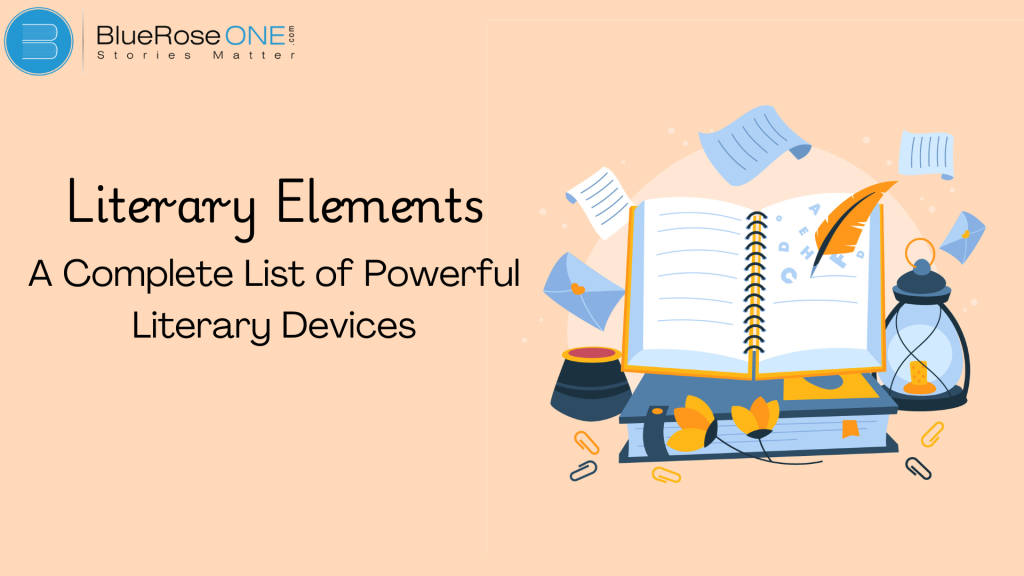
Literary Elements: A Complete List of Powerful Literary Devices
What makes a narrative memorable? The answer is typically found in the usage of literary elements. Literary elements are the instruments that writers employ to convey depth, passion, and significance in their works. Understanding these elements allows readers and writers to gain greater respect for storytelling. You may also like: Book Review: Lord of the Flies by William Golding Essential Literary Elements in Storytelling Plot The plot is the foundation of any story, defining the events that propel it forward. The introduction, rising action, climax, declining action, and resolution all play important roles in keeping the audience engaged. A strong storyline establishes a logical flow, sustains tension, and ensures emotional engagement. Whether it’s a simple chronology or a complicated, non-linear framework, the plot shapes a story and keeps readers engaged with its advancement. Setting Setting is an important literary element that shapes the backdrop of a story. It contains the time, location, and environment in which the events occur, providing context for the characters and plot. A well-crafted environment can engross readers, elicit emotions, and heighten the story’s tone or topic. Whether it’s a bustling city, a mythical realm, or a historical era, the setting is critical to bringing the story to life and anchoring it in its environment. You may also like: 10 Best Magical Books That Combine Christmas and Fantasy Characters Characters are one of the most important literary aspects in storytelling, acting as the driving force behind the plot. They can play protagonists, antagonists, or supporting parts, with each adding to the plot’s growth and ideas. Well-developed characters engage readers by eliciting empathy, wonder, or intrigue, making the story more relatable and compelling. Their motivations, conflicts, and transformations provide the foundation of captivating storytelling, keeping the audience engaged throughout the trip and resolution. Theme The theme is an important literary element because it conveys the story’s fundamental idea or underlying message. It delves into universal themes such as love, conflict, and identity, allowing readers to relate emotionally with the story. Themes provide depth and meaning, transforming simple plots into thought-provoking stories. Identifying the theme allows readers and writers to better comprehend the story’s goal and emotional relevance. This makes the theme an essential component in creating memorable stories. You may also like: 10 Must-Read Kindle Unlimited Titles You Can’t Miss Symbolism Symbolism is a powerful literary element that use objects, colors, or gestures to convey deeper meanings or abstract concepts. For example, a dove frequently represents calm, yet a storm may represent chaos or change. Writers employ symbolism to give layers of meaning to their stories, which increases reader involvement and interpretation. This literary element gently conveys themes and emotions, making stories richer and more memorable for the listener. Motif A motif is a recurrent element, topic, or idea that emerges throughout a story, adding meaning and emotional depth. This literary element may take the form of an object, color, phrase, or action that underlines the narrative’s fundamental themes. For example, the recurrent usage of light and darkness in a story could represent hope vs despair. Authors develop links in their work by including motifs, which makes their tale more compelling and memorable. You may also read: What is Dramatic Irony in Literature? Definition, Examples and Tips Metaphor A metaphor is a powerful literary element that connects two unconnected objects to suggest that they are similar in a meaningful way. It allows readers to envision things and adds depth to storytelling. For example, saying “time is a thief” suggests that time takes away moments from our life. Metaphors enhance storytelling by instilling vivid images and emotional connections, making them more compelling. Writers frequently utilize metaphors to explain complicated topics in a simple, compelling way. Simile A simile is a literary element that contrasts two distinct objects using “like” or “as” to create vivid imagery and increase comprehension. For example, “Her smile was as bright as the sun” conveys warmth and cheerfulness. Similes enhance storytelling by making descriptions more accessible and engaging, allowing readers to imagine situations and feelings. Similes, as a fundamental literary feature, are effective tools for adding depth and clarity to narratives, making them more memorable and dramatic. Alliteration Alliteration is a literary element that involves the repetition of the same consonant sound at the start of closely related words. It adds rhythm and can improve the atmosphere or highlight specific lines in a story. For example, “Peter Piper picked a peck of pickled peppers” employs alliteration to make the line memorable. This approach is often employed in poetry and prose to highlight essential concepts, making it a useful tool in storytelling. You may also read: Top 10 Classic Literature Books Everyone Should Read At Least Once Allusion An allusion is a subtle reference to a well-known person, location, event, or work of literature. It enriches a tale by relating it to something the audience is familiar with, rather than requiring extensive explanations. Allusions are effective literary elements that can elicit emotions, provide background, or emphasize a theme. Writers frequently utilize them to create similarities between their novel and other cultural or historical events, making their work more interesting and relatable to readers. Juxtapostion Juxtaposition is a literary technique in which two opposing ideas, characters, or circumstances are placed next to one another to emphasize their differences. This contrast might heighten suspense, highlight specific characteristics, or provide depth to the plot. For example, juxtaposing a hero and a villain might highlight their opposite characteristics. Writers utilize juxtaposition to emphasize specific themes or messages, allowing readers to better appreciate the narrative’s and characters’ complexities. It’s an important narrative strategy that increases the overall effect of the plot. Flashback A flashback is an important literary element that allows writers to transport the reader back in time and disclose key events from a character’s history. This strategy helps the reader have a better grasp of a character’s motivations, fears, and relationships. Flashbacks interrupt the present narrative, providing information and insight that may be critical to the story’s development. Flashbacks are a powerful…
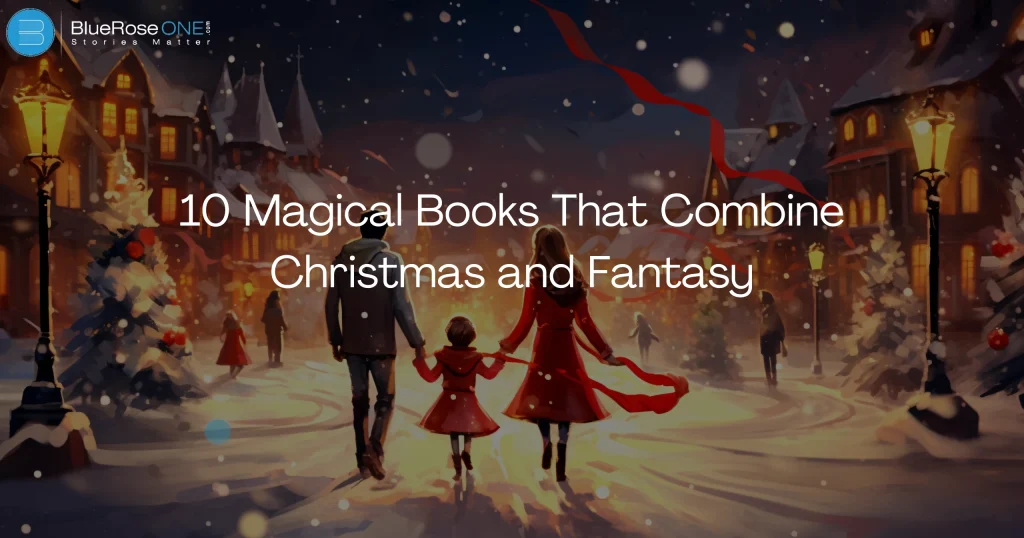
10 Best Magical Books That Combine Christmas and Fantasy
The holiday season has its own distinct appeal, and nothing enhances it more than a touch of fantasy. When Christmas and fantasy mix, the outcome is pure magic: stories that transport us to enchanted places while celebrating the warmth and beauty of the holiday season. Here are seven enchanting magical books that seamlessly merge Christmas with fantasy, ideal for snuggling up by the fire. You may also read: What is Dramtic Irony in Literature? Definition, Examples and Tips The Lion, the Witch and the Wardrobe – Magical Books 1. The Lion, the Witch and the Wardrobe by C.S. Lewis C.S. Lewis’s popular story transports readers to the mystical kingdom of Narnia, which is stuck in everlasting winter under the White Witch’s dominion. However, optimism is introduced with the mention of Father Christmas, who represents the return of joy and rejuvenation. This famous story mixes adventure, enchantment, and the Christmas spirit, making it a perennial holiday read. Hogfather – Magical Books 2. Hogfather by Terry Pratchett What happens when the Discworld version of Santa Claus goes missing? In Terry Pratchett’s Hogfather, the fanciful Hogfather must be spared to keep the magic of believe alive. This satirical but touching narrative combines humor, tradition, and fantasy, making it an outstanding Christmas read. A Christmas Carol – Magical Books 3. A Christmas Carol by Charles Dickens No Christmas reading list is complete without this classic story. Dickens tells a ghostly story, introducing readers to the spirits of Christmas Past, Present, and Future. Ebenezer Scrooge’s metamorphosis from a miser to a guy full of holiday cheer is still a compelling and beautiful story for people of any age. You may also like: Top 10 Classic Literature Book Everyone Should Read At Least Once The Polar Express – Magical Books 4. The Polar Express by Chris Van Allsburg In this wonderful narrative, you’ll board a train destined for the North Pole. The Polar Express portrays the enchantment of childhood believing in Santa Claus with magnificent pictures and a fascinating plot. Its ageless message of faith and wonder makes it an essential read during the holiday season. The Life and Adventures of Santa Claus – Magical Books 5. The Life and Adventures of Santa Claus by L. Frank Baum The author of The Wizard of Oz reimagines Santa Claus’ origin story in a universe filled with mythological animals and amazing adventures. This book takes a fantasy approach to Christmas traditions, constructing a story that seems both familiar and extraordinary. Letters from Father Christmas – Magical Books 6. Letters from Father Christmas by J.R.R. Tolkien J.R.R. Tolkien’s charming collection of letters to his children vividly depicts the North Pole. This book is filled with quirky drawings, polar bear stories, and Santa’s exploits, making it a treasure mine of imagination and Christmas cheer. You may also like: Dynamic Characters: Definition, Examples and Tips to Write Them The Snowman – Magical Books 7. The Snowman by Raymond Briggs This wordless masterpiece depicts the enchanting narrative of a youngster who creates a snowman that comes to life. The simple yet meaningful story captures the fleeting magic of winter and friendship, making it a holiday favorite for readers of all ages. The Box of Delights – Magical Books 8. The Box of Delights by John Masefield In this fascinating story, young Kay Harker discovers a magical box that allows him to travel through time and have incredible adventures. Set against the backdrop of Christmas, the story combines fantasy, intrigue, and the holiday spirit in a wonderfully enchanting way. One Christmas Wish – Magical Books 9. One Christmas Wish by Katherine Rundell This lovely magical realism story follows a young kid whose Christmas Eve wish awakens surprising companions. This novel is both captivating and deeply moving, exploring topics such as love, sorrow, and the actual meaning of the season. You may also read: Query Letter vs. Cover Letter: What’s the Difference? Greenglass House – Magical Books 10. Greenglass House by Kate Milford Greenglass House is a cozy mystery set in a snow-covered inn over the holiday season, complete with secrets, ghost stories, and a touch of magic. It’s an ideal read for anyone who enjoys a mix of holiday pleasure and imaginative mystery. Conclusion These ten amazing magical books celebrate the delights of Christmas and the power of creativity. Whether you’re revisiting a classic or discovering a new favorite, these novels provide the ideal escape into worlds where holiday enchantment knows no bounds. Grab a warm drink, curl up, and let these stories fill your heart with holiday cheer. Frequently Asked Questions 1. What makes a book a good Christmas fantasy? A good Christmas fantasy combines festive elements like snow, Santa Claus, or holiday traditions with imaginative worlds, magical creatures, or supernatural themes. 2. Are these books suitable for all age groups? Most of the books on this list cater to all ages, though some, like The Box of Delights, may appeal more to younger readers, while Hogfather suits older audiences. 3. Can these books be enjoyed outside the holiday season? Absolutely! While they carry a festive spirit, their engaging stories and magical themes make them enjoyable year-round. 4. Which book is best for young readers? The Polar Express and The Snowman are perfect for young readers, offering simple yet magical narratives. 5. How do Christmas and fantasy enhance each other? Christmas and fantasy both evoke a sense of wonder and possibility, creating stories that inspire belief, joy, and the magic of the season.

Dramatic Irony: Definition, Examples and Tips – BlueRoseONE
Have you ever seen a movie or read a book where you knew something that the characters didn’t? That is dramatic irony in action! It’s a great literary device that keeps readers engaged, waiting to see how the characters react when they ultimately discover the truth. Dramatic irony not only adds dimension to storytelling, but it also fosters emotional connections with the audience. What is Dramatic Irony? Dramatic irony is a literary device in which the audience understands something crucial but the characters in the story do not. This adds tension or humor because readers predict how the characters will respond when they find the truth. For example, in Shakespeare’s Romeo and Juliet, the audience knows Juliet is still alive while Romeo believes she is dead. Dramatic irony is frequently employed to enhance emotional impact and keep readers interested in the story’s progression. How Dramatic Irony Differs from Other Types of Irony Dramatic irony differs from other varieties of irony, such as verbal and situational irony, in that it assumes the audience knows something the characters do not. Verbal irony occurs when a speaker says one thing but intends another, usually to communicate sarcasm. Situational irony occurs when there is a significant difference between what is expected and what actually happens. Dramatic irony, on the other hand, heightens tension or emotional engagement by providing the audience with exclusive information. For example, in Romeo and Juliet, the audience knows Juliet is alive while Romeo believes she is dead. This distinguishing feature makes dramatic irony an effective storytelling tool. The Mechanics of Dramatic Irony How Dramatic Irony Works Dramatic irony works by providing the audience or reader with knowledge that the characters in a story do not have, resulting in a tension between what is known and what is happening. This literary device is based on the audience being “in the know” about a situation, while the characters are oblivious of important aspects. For example, in Romeo and Juliet, the audience is aware that Juliet is alive, but Romeo believes she has died, leading to his tragic conclusion. This knowledge gap heightens emotional engagement since readers anticipate the protagonists’ revelation of the truth, which frequently results in moments of astonishment, laughter, or tragedy. Building Tension and Suspense Dramatic irony is an effective technique for increasing tension and suspense in a story. When the viewer knows something that the protagonists don’t, it builds anticipation for when and how the truth will be revealed. For example, in Romeo and Juliet, the audience knows Juliet is alive, but Romeo believes she has died. This knowledge puts readers on edge, increasing emotional engagement and compelling them to keep turning the pages to see how the dramatic resolution plays out. Engaging the Audience Emotionally Dramatic irony is an effective method for emotionally engaging the audience by creating a disconnect between what the characters know and what the readers or viewers understand. This generates tension, expectation, and empathy. For example, in Shakespeare’s Romeo and Juliet, the audience knows Juliet is alive, but Romeo believes she has died. This awareness renders Romeo’s actions sad, drawing readers into the plot. Emotional engagement keeps the audience interested in the narrative’s outcome. You may also like: Query Letter vs. Cover Letter: What’s the Difference? Examples of Dramatic Irony in Literature Dramatic Irony in Shakespeare’s Plays Romeo and Juliet: The audience knows Juliet isn’t truly dead, but Romeo doesn’t, leading to a heartbreaking conclusion. Othello: Iago’s schemes are crystal clear to the audience, but Othello remains tragically unaware. Dramatic Irony in Modern Literature The Great Gatsby: Readers understand Gatsby’s idealism, but the characters misinterpret his intentions. Of Mice and Men: The audience anticipates the tragic end of Lennie before George does, amplifying the emotional impact. Benefits of Using Dramatic Irony in Storytelling Enhancing Reader Engagement Dramatic irony increases reader engagement by establishing a link between the audience and the story. When readers know important knowledge that the protagonists do not, it heightens their anticipation as they wait to see how the events unfold. This knowledge inspires emotions such as suspense, sympathy, and even laughter, keeping readers interested in the story. Dramatic irony keeps the audience interested and ready to find out what happens to the characters by involving them in the story’s evolution. Deepening Character Relationships Dramatic irony can enrich character connections by complicating their interactions. When the audience understands something that the characters don’t, tension and emotional investment arise. For example, a character may unintentionally trust someone with a secret goal, eliciting empathy or irritation in the reader. This strategy emphasizes vulnerabilities, misconceptions, or trust concerns, helping readers to connect more closely with the characters and their changing dynamics throughout the novel. Adding Complexity to the Plot Dramatic irony improves the plot by adding layers of complexity. When the audience knows something the characters don’t, it builds suspense and anticipation. This understanding enables the writer to delve further into emotional problems as the characters’ actions or decisions become more relevant. The disparity between what the audience anticipates and what actually happens can make the storyline more unpredictable and interesting, propelling the story to powerful, often surprising, resolutions. You may also like: Top 10 Classic Literature Books Everyone Should Read Creating Dramatic Irony in Your Writing Understanding Your Audience’s Perspective To use dramatic irony effectively, you must first comprehend your audience’s perspective. Dramatic irony happens when the audience understands something that the actors do not, resulting in suspense and tension. Consider what your readers expect or already know, and carefully deliver information at the appropriate times. This intensifies the emotional effect since the viewer expects how the characters will react, adding levels of meaning and excitement to the plot. Understanding this promotes better relationships and more engaging narratives. Developing Situations for Irony To establish irony in your writing, imagine a scenario in which the audience knows something important that the protagonists do not. The difference between the audience’s awareness and the characters’ ignorance is the cornerstone of dramatic irony. For example, a character may…

Dynamic Characters: Definition, Examples and Tips to Write Them
Have you ever encountered a fictional character that altered your vision of storytelling? This is the power of a dynamic character! These characters develop, expand, and adapt throughout the novel, taking readers on an emotional journey. In this post, we’ll look at what distinguishes dynamic characters and how to develop them. What is a Dynamic Character? Dynamic characters are individuals who experience major internal changes over a novel. These shifts are frequently the result of life experiences, disputes, or revelations that call into question their views, attitudes, or behaviors. Key Traits of a Dynamic Character Growth One of the most important characteristics of a dynamic personality is growth. These characters go through considerable personal development or change during the novel, influenced by their experiences, problems, and connections. Their development frequently involves a transformation in their values, beliefs, or conduct, making them more relevant and interesting to readers. In A Christmas Carol, Ebenezer Scrooge, for example, evolves from a selfish miser to a generous, kind-hearted man, demonstrating the potential of internal change brought about by self-reflection and external influence. Complexity Complexity is an important characteristic of dynamic individuals, as they frequently have multifaceted personalities, conflicting agendas, and emotional depth. They are not one-dimensional, but rather mirror the complexities of real people, making them accessible and engaging. Their actions and decisions are influenced by their previous experiences, internal conflicts, and shifting perspectives. This intricacy enables readers to identify with the character on a deeper level as they follow their challenges, growth, and transformation throughout the novel. Impact One distinguishing feature of a dynamic character is their major impact on the story’s narrative and themes. These characters frequently drive the plot with their decisions and development, influencing other characters and the broader story. Their metamorphosis can emphasize the story’s main theme, making them memorable and sympathetic to readers. For example, Ebenezer Scrooge’s transformation in A Christmas Carol not only changes his life but also affects everyone around him, reinforcing themes of compassion and redemption. You may also read: Query Letter vs. Cover Letter: What’s the Difference? Dynamic Characters vs Static Characters Dynamic Characters Change and grow throughout the story. Often face significant personal challenges. Example: Harry Potter, who matures and learns to face his fears. Static Characters Remain unchanged from beginning to end. Serve as stable reference points for the dynamic ones. Example: Sherlock Holmes, whose personality remains consistent despite his adventures. The Role of Dynamic Characters in Stories Dynamic characters act as the engine of the story. Their growth: Drives the narrative forward: Dynamic characters drive the narrative along by actively affecting its events and outcomes. Their development, decisions, and shifting views provide tension and move the plot along, keeping readers interested. For example, as a dynamic character grows from their experiences, their actions frequently result in important events, such as settling disputes or finding hidden facts. This growth not only enriches the character’s arc, but it also keeps the plot moving forward and adds emotional depth. Creates emotional depth: Dynamic characters add emotional depth by changing in response to the story’s events and conflicts. Their growth reflects real-life obstacles, making their path more realistic and intriguing for readers. As they face problems, their emotions—whether joy, anxiety, rage, or sorrow—feel authentic and multifaceted. This emotional complexity enables readers to form strong bonds with the characters, generating empathy and investment in the plot. Such complexity enhances the narrative and leaves a lasting effect on the viewer. Shapes the story’s themes: Dynamic characters help shape a story’s ideas by reflecting its primary messages via their development and actions. As these people progress, their personal difficulties and transformations reflect bigger themes such as redemption, love, and resilience. In A Christmas Carol, Ebenezer Scrooge’s path from greed to generosity emphasizes the topic of compassion. Dynamic characters add emotional depth and resonance to ideas by demonstrating how characters learn and develop. Examples of Dynamic Characters in Literature Classic Examples Ebenezer Scrooge (A Christmas Carol): From a miser to a compassionate man. Elizabeth Bennet (Pride and Prejudice): Learns to overcome her prejudices. Modern Examples Katniss Everdeen (The Hunger Games): Transforms from a reluctant participant to a revolutionary leader. Arya Stark (Game of Thrones): Evolves from a naive child to a fierce warrior. Characteristics of a Well-Written Dynamic Character Believable Growth: A well-written dynamic character develops convincingly throughout the novel, growing in reaction to obstacles and experiences. This development appears natural, arising from the character’s nature, motivations, and the experiences they encounter. For example, a selfish protagonist may eventually develop compassion after witnessing the struggles of others. Believable progress allows readers to empathize with the character’s journey, making their metamorphosis more relevant and emotionally fulfilling. It adds depth and realism to the character’s growth trajectory. Complex Personality: A well-written dynamic character frequently has a complicated personality that resembles real-life people. These characters’ qualities, flaws, anxieties, and desires make them feel real and approachable. They may experience internal conflicts, adjust to difficulties, or reveal unexpected layers over time. This complexity ensures that they aren’t one-dimensional but rather nuanced, demonstrating growth or change throughout the narrative. Readers are drawn to people whose complexities make them surprising and truly human. Relatable Motivations: A well-written dynamic character frequently has reasons that readers can identify with. These reasons should be believable and rooted in the character’s background, goals, or challenges. Whether it’s the quest of love, justice, or personal growth, realistic motivations make the character’s actions credible and their path worthwhile. When readers understand why a character acts the way they do, it fosters a stronger emotional connection, making the character’s growth or change over the novel more meaningful. You may also like: Top 10 Classic Literature Books Everyone Should Read You may also like: HEA Meaning in Books, Texts, and Pop Culture Explained How to Write Dynamic Characters Step 1: Understand Your Character’s Arc To write dynamic characters, you must first grasp their arc. A character arc is the journey your character takes through the novel, changing or growing in response to obstacles and events….
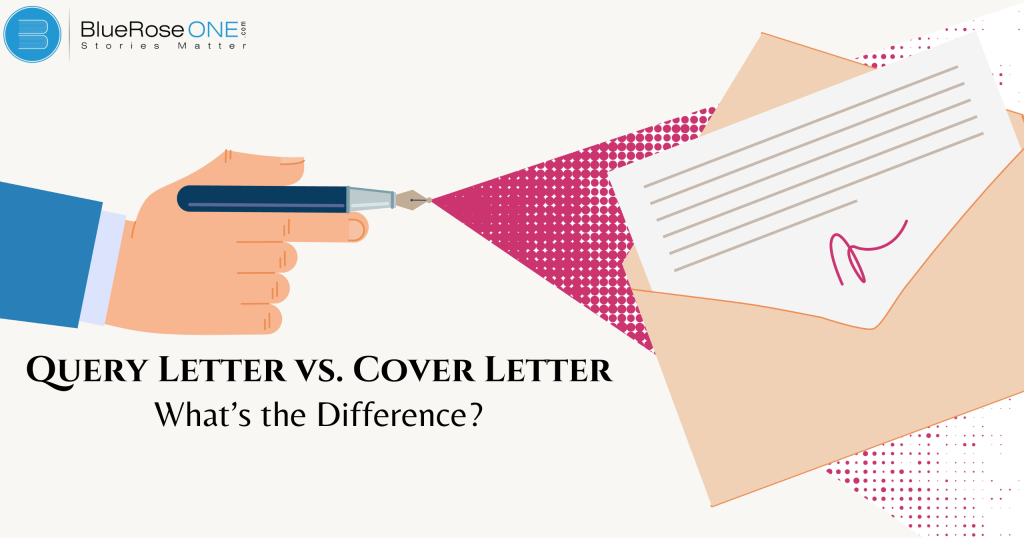
Query Letter vs. Cover Letter: What’s the Difference?
Have you ever felt like you’re drowning in a sea of letters, trying to figure out which ones go where? If you’ve ever wondered what the difference is between a query letter and a cover letter, you’re not alone. These two sorts of letters have separate functions, and understanding how to write them can make or break your possibilities. Let us break it down. What is a Query Letter? A query letter is a formal letter that authors send to literary agencies or publishers to pitch their book idea. It briefly introduces the work, emphasizes its genre and intended audience, and provides a concise description of the plot or primary idea. The purpose of a query letter is to capture the recipient’s attention and persuade them to request the complete manuscript. It also provides a brief author bio that highlights important writing experience or achievements. You may also like: How to Publish a Book? | Publish Your Book | BlueRoseOne Key Elements of a Query Letter The Hook: A gripping opening sentence or paragraph to draw the reader in. The Summary: A concise description of your project, focusing on its unique elements. Author Bio: A brief section highlighting your writing credentials or relevant experience. When to Use a Query Letter A query letter is used to pitch a creative work, such as a book, essay, or movie, to an agent, publisher, or editor. Its goal is to pique their interest and provide a brief description of your project, including its genre, target demographic, and a captivating hook. A query letter is often used to measure interest before submitting a full manuscript or proposal. It is necessary for authors who want to be represented or published in traditional marketplaces. What is a Cover Letter? A cover letter is a professional document that you include with your resume or job application to introduce yourself to potential employers. It showcases your relevant abilities, experiences, and qualifications for the position you’re looking for. Unlike a resume, which shows accomplishments, a cover letter explains why you are a good fit for the position and demonstrates your personality. A strong cover letter is personalized to the exact job, expressing your interest and excitement for the role. Key Elements of a Cover Letter Salutation and Introduction: Address the recipient directly and state your purpose. Body: Highlight your qualifications and align them with the role. Closing: Finish with a strong call to action, such as requesting an interview. You may also read: How Can I Get a Book Published? When to Use a Cover Letter A cover letter is often used when applying for a specific position or internship. It supplements your CV by introducing you, emphasizing relevant talents, and outlining why you’re an excellent candidate for the position. Cover letters are required when companies request them in job listings or to personalize your application. Unlike query letters, which market creative works to agents or publishers, cover letters emphasize professional qualities for job openings. Key Differences Between Query Letters and Cover Letters Target Audience One significant distinction between query letters and cover letters is their intended audience. Query letters are made expressly for literary agents or publishers, with the goal of pitching a creative product such as a novel or film. Cover letters, on the other hand, are often sent with a job application and addressed to potential employers or hiring managers. The goal of a query letter is to ignite interest in a work, while a cover letter focuses on showcasing professional qualifications and expertise for a specific post. Content and Structure A query letter is intended to pitch a creative idea, such as a novel or film, to an agent or publisher. It contains a brief synopsis of the work, the genre, the word count, and a hook to pique interest. In contrast, a cover letter is used in job applications to explain your talents, experiences, and why you are qualified for the position. While query letters focus on a specific creative idea, cover letters emphasize personal qualifications and use a more formal, professional tone. Tool and Style The tone and style of inquiry letters and cover letters are different. To entice agents or publishers, a query letter often takes on a compelling and imaginative tone, highlighting your unique voice. It often captures the spirit of the project you’re pitching. In contrast, a cover letter has a more professional and official tone, stressing your qualifications and appropriateness for the job. While both need clarity and conciseness, their approaches are tailored to different audiences and goals. Purpose and Goals A query letter is used to pitch a creative project, such as a novel or film, to an agent or publisher. It focuses on generating interest in the project and obtaining representation or publishing. In contrast, a cover letter is often used in job applications to highlight your qualifications and explain why you’re a suitable fit for a given position. A cover letter markets your talents and expertise, whereas an inquiry letter promotes your work. You may also like: What is Foil Character? Definition and Examples in Literature Tips for Writing an Effective Query Letter Research your audience thoroughly. Use an attention-grabbing hook. Be concise but engaging. Tips for Writing an Effective Cover Letter Tailor it to the specific job or client. Emphasize your most relevant skills. Check and recheck for errors. Tools and Resources for Writing Both Letters Writing templates and guides. Books on professional correspondence. Online courses like Coursera or Udemy. Conclusion Understanding the distinctions between a query letter and a cover letter is critical for anyone entering the fields of writing or job hunting. Each has its own style, structure, and purpose, but both are effective tools when utilized effectively. So, the next time you need to send one, remember these pointers and let your words work their magic. Frequently Asked Questions Can a query letter be used as a cover letter? No, they serve different purposes and target different audiences. How long should a query letter…
